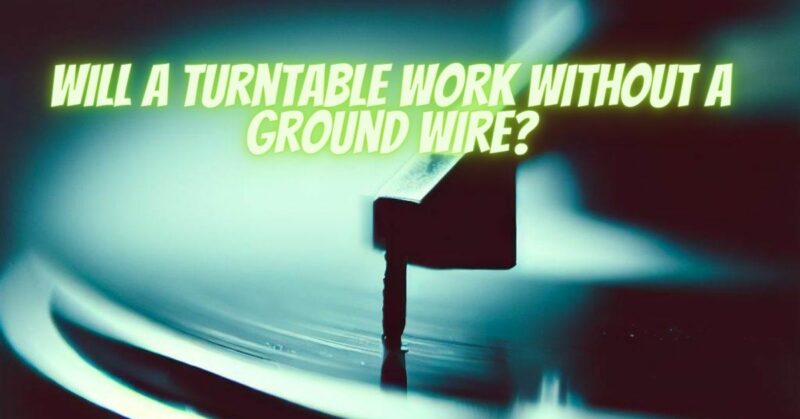Turntables, with their vintage charm and captivating sound, have rekindled a love for analog music playback. As you embark on your journey with vinyl, questions about grounding and its necessity may arise. Among these questions is the intriguing query: Will a turntable work without a ground wire? In this article, we’ll delve into the concept of grounding in turntables, the role of the ground wire, and whether a turntable can function without it.
Understanding Grounding in Turntables:
Grounding in turntables involves establishing an electrical connection between the turntable’s metal components and a stable ground source. The purpose of grounding is to minimize or eliminate unwanted electrical interference, such as electromagnetic and radiofrequency interference, that can affect the audio signal during playback.
The Role of the Ground Wire:
The ground wire serves as the conduit for electrical interference to be directed away from the audio signal path. It provides a pathway for unwanted noise and interference to be safely discharged into the ground, preventing these disturbances from affecting the quality of the sound produced by the turntable.
Can a Turntable Work Without a Ground Wire?
In some cases, a turntable can function without a dedicated ground wire, but there are important considerations to keep in mind:
- Shielded Cables: Some turntables come equipped with high-quality shielded interconnect cables that help reduce the risk of interference. If your turntable uses these cables and you’re not experiencing unwanted noise, you might not require a separate ground wire.
- Built-in Grounding: Some turntables are designed with internal grounding mechanisms that minimize interference. If your turntable has this feature and is functioning well without noticeable interference, a separate ground wire might not be necessary.
- External Factors: The need for a ground wire can also depend on external factors, such as the quality of your audio equipment, the layout of your setup, and the presence of electromagnetic interference sources.
When a Ground Wire Is Necessary:
While some turntables can operate without a separate ground wire, there are instances when using a ground wire is essential:
- Unshielded Cables: If your turntable uses unshielded or poorly shielded cables, you’re more susceptible to electromagnetic interference. Using a ground wire can help mitigate interference-related issues.
- Phono Preamplifiers: If your turntable is connected to an external phono preamplifier, follow the manufacturer’s recommendations. Some phono preamps might require grounding for optimal performance.
- Hum and Noise Issues: If you’re experiencing persistent humming, buzzing, or other unwanted noise in the audio output of your turntable, proper grounding can help alleviate these issues.
While a turntable can technically work without a dedicated ground wire, the decision to use one depends on several factors, including the quality of your cables, the presence of interference sources, and the design of your turntable. Experimenting with different setups, trying shielded cables, and exploring internal grounding mechanisms can help you determine whether a separate ground wire is necessary for your turntable to deliver optimal audio quality. If you encounter persistent issues or uncertainties, consulting the manufacturer’s guidelines or seeking advice from audio experts can provide valuable insights to ensure that you’re getting the most out of your turntable setup.


